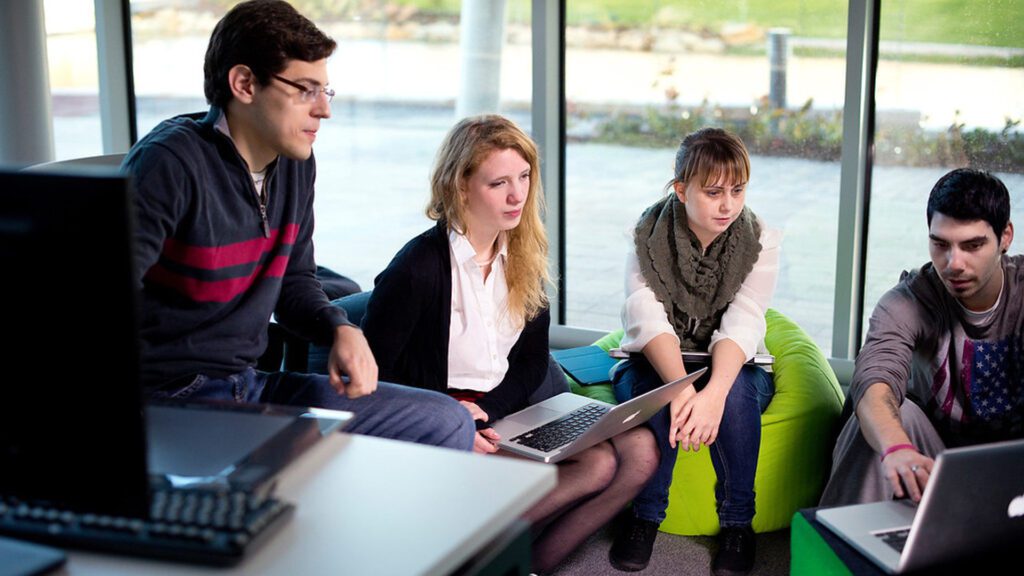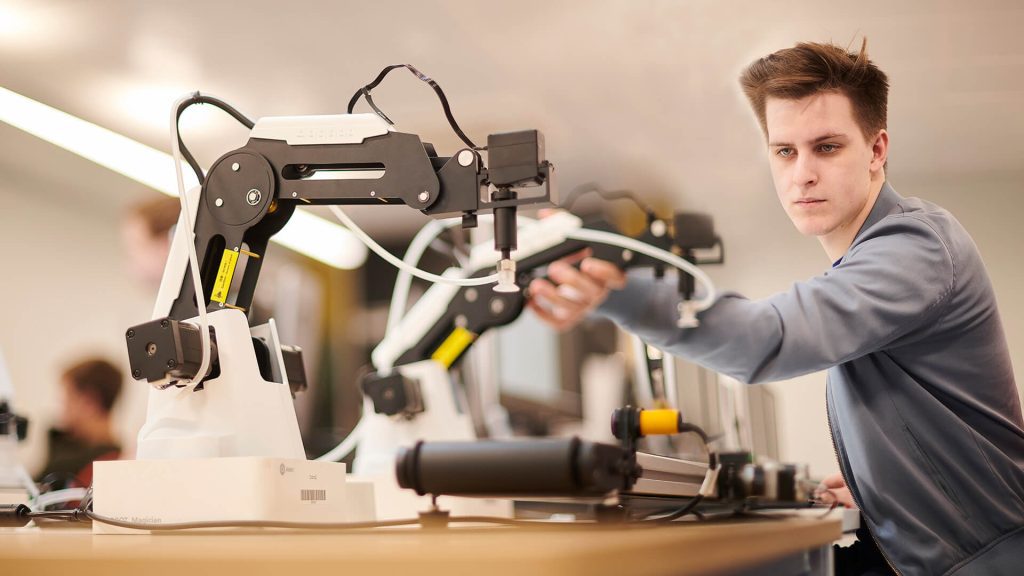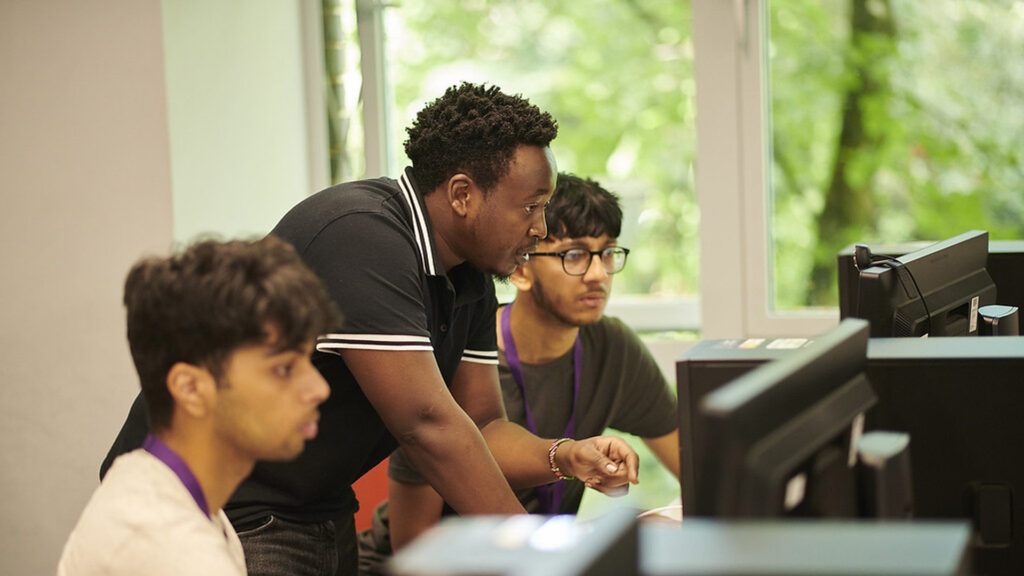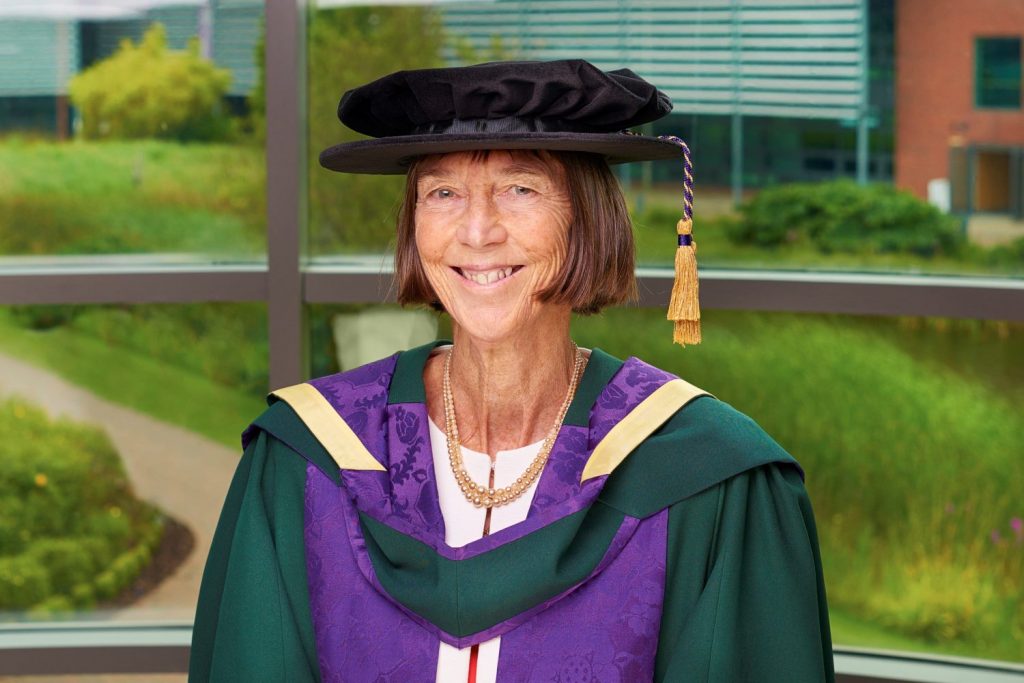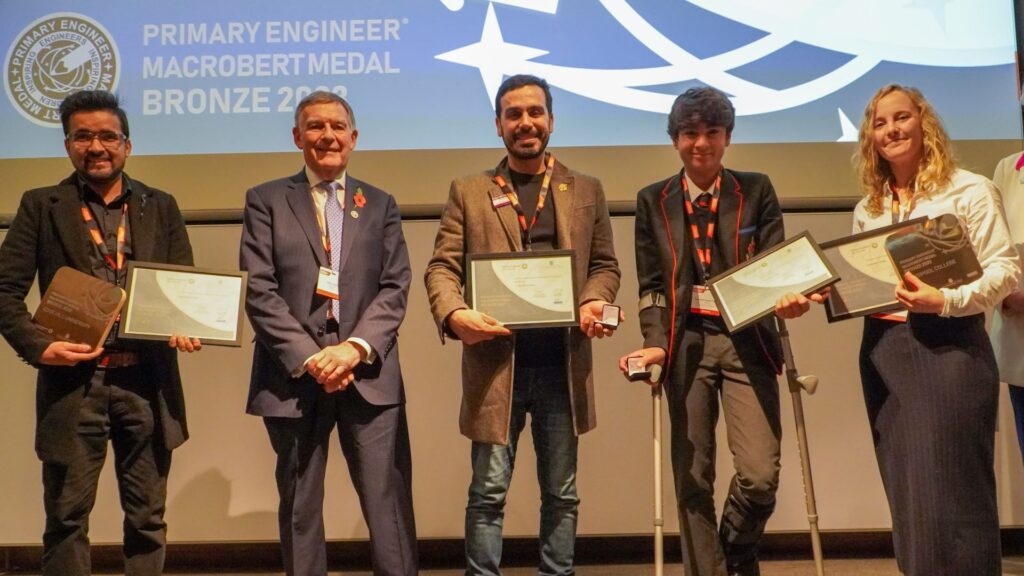Electronic Engineering MEng (Hons)
UCAS code: H601
Are you ready to solve big problems? Dream of working with great engineers from around the world? We’ll help you do both. Our integrated Masters degree will equip you to harness technology and challenge the norm.
Closed to applications for September 2024.
Overview
| Course length: | 4 years full-time |
|---|---|
| Start dates: | September 2025 |
| Location: | Edge Hill University |
| Example offers: | BBC-ABB (A Level) or DMM-DDM (BTEC) View full entry criteria |
| Subject(s): | Engineering and Physics |
| Faculty: | Arts and Sciences |
| Department: | Engineering |
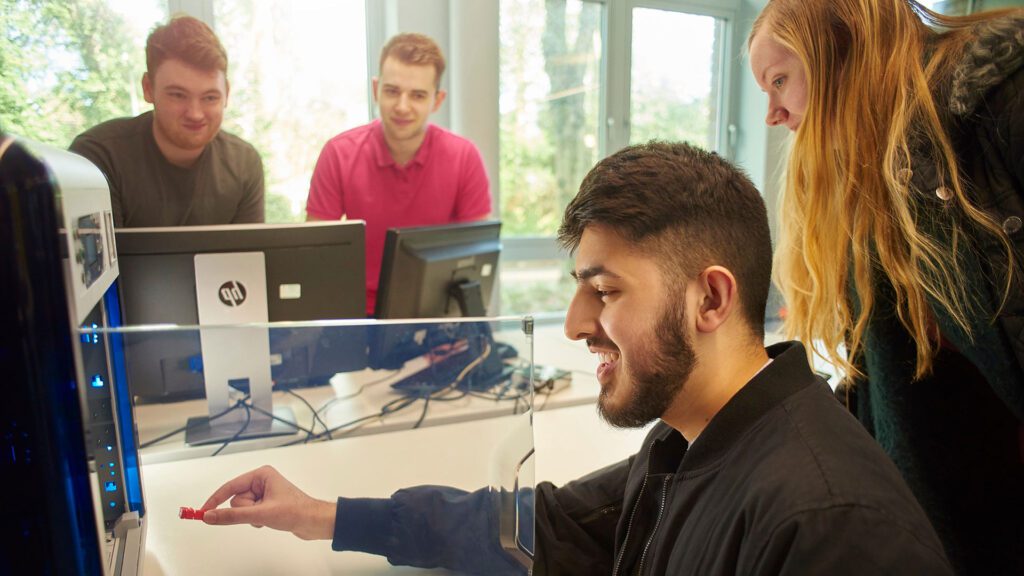
If you’re curious and like to think creatively, then this degree is the perfect match for you. Our dedicated teaching staff will help immerse you in the wonder of electronic engineering.
This integrated Masters degree will keep you a step ahead academically. It’ll prepare you for future senior and specialist jobs where you’ll be given important responsibilities early on.
While studying with us, you’ll develop in-depth knowledge in electronic engineering, programming and applied mathematics, sensor systems and instrumentation techniques, as well as wireless communications and smart systems.
You’ll sharpen your technical, communication and team working skills, vitally important for the world of work. We’ve worked hard to create a supportive environment for our students, an environment that helps you be the best you can be.
Course features
-
International students can apply
-
Sandwich year option available
-
Studying abroad option available
What you'll study
Your first year modules will provide a solid foundation for the rest of your degree. As you embed yourself within the course, you’ll design, analyse, and construct systems. Key themes include the core principles that underpin electronic and electrical engineering, digital circuitry and logic, computation and programming, and mathematics for engineering.
Your second year will ground you in more specialist modules. You’ll investigate topics such as mathematics for electronic engineering and programming, industrial automation, and control systems. Our simulated work environment will help you and your peers work according to live briefs. The result? You’ll deliver real products. At the end of the year, you’ll have the option of taking an exciting year-long industrial placement.
You’ll develop a deeper understanding of the subject in your third year. A multidisciplinary group design project will continue to expand your knowledge and experience of working in teams. You’ll examine embedded systems, microprocessors and sensor systems. You’ll also sharpen your engineering management and enterprise expertise.
The primary goal of your final year will be on independent study and learning. You’ll explore the foundations of building smart systems and gain knowledge of wireless communication systems and their applications. You’ll also get the exciting opportunity to conduct a research and development project. Through this, you’ll be able to showcase your practical project management skills. Not only that, but it’ll set you apart in conversations with future employers.
How you'll study
Teaching methods are designed in consultation with leading employers in the region. Many classes are based in engineering and computing laboratories, focusing on student activity as a means of learning. We introduce theoretical concepts by building on concrete practical activity.
Classes are highly interactive, with practical application of concepts a key factor, as well as cases drawn from real-life. Workshops, seminars, group tutorials and practical exercises provide opportunities for you to work with your peers and develop the essential people skills to complement your technical ability.
You will be required to attend up to four days a week.
How you'll be assessed
You will be assessed through a combination of practical exercises, reports, essays, presentations and examinations. We want you to develop the ability to work effectively both independently and as part of a team, therefore assessment includes both of these forms, though the emphasis is strongly on individual work.
Who will be teaching you
You will be taught by staff who are passionate about student learning and development, as well as benefitting from guest lectures delivered by industry experts. The programme team are specialists in engineering and computing and active researchers in areas including complex systems, security, Internet of Things, telecommunications and applied mathematics. Academic staff are regular contributors to international conferences and peer-reviewed journals.
Entry criteria
Entry requirements
Typical offer 112-128 UCAS Tariff points. This must include A Level Mathematics at Grade C or above or equivalent. GCSE English Language at Grade C or Grade 4 or above, or equivalent, is also required.
For students studying BTEC a BTEC Extended Diploma in Engineering is preferred. Typical offers will be DMM, with grade Merit or above in one of the following units:
- to solve engineering problems
- engineering mathematics
Example offers
| Qualification | Requirement |
|---|---|
| A Level | BBC-ABB. |
| BTEC Extended Diploma (or combination of BTEC QCF qualifications) | Distinction, Merit, Merit (DMM). |
| T Level | Overall grade of Merit. |
| International Baccalaureate (IB) | We are happy to accept IB qualifications which achieve the required number of UCAS Tariff points. |
| Access to Higher Education Diploma | 45 credits at Level 3, for example 15 credits at Distinction and 30 credits at Merit, 24 credits at Distinction and 21 credits at Merit, or 30 credits at Distinction and 15 credits at Merit. The required total can be attained from various credit combinations. |
Please note, the above examples may differ from actual offers made. A combination of A Level and BTEC awards may also be accepted.
If you have a minimum of two A Levels (or equivalent), there is no maximum number of qualifications that we will accept UCAS points from. This includes additional qualifications such as Extended Project Qualification (EPQ), AS Levels that haven't been continued to A Level, and General Studies AS or A Level awards.
English language requirements
International students require IELTS 6.0, with a score no lower than 5.5 in each individual component, or an equivalent English language qualification.
If your current level of English is half a band, one band, or one-and-a-half bands lower, either overall or in one or two elements, you may want to consider our Pre-Sessional English course.
How to apply
Apply full-time
Read our guide to applying through UCAS to find out more about the application process.
International
Please see our international student pages for further information about how to apply as a prospective international student.
Closed to applications for September 2024.
Should you accept an offer of a place to study with us and formally enrol as a student, you will be subject to the provisions of the regulations, rules, codes, conditions and policies which apply to our students. These are available at www.edgehill.ac.uk/studentterms.
If you join a full time undergraduate degree at Edge Hill University, we will guarantee you the offer of a room in our halls of residence for the first year of your course.
Discover our accommodation
Facilities
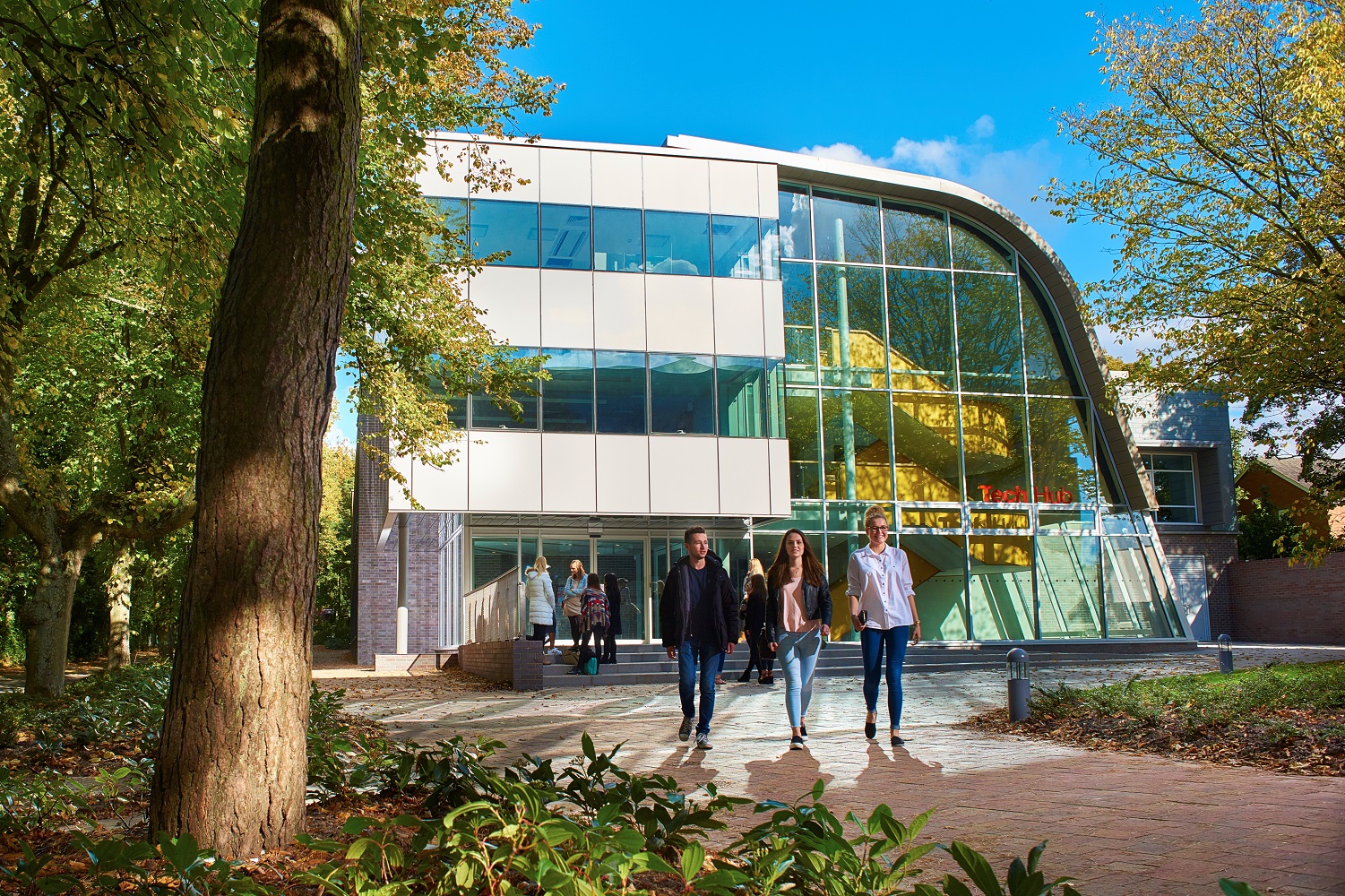
The Department of Engineering is based in the state-of-the-art £13m Tech Hub. This purpose-built development offers highly contemporary suites of outstanding facilities for Engineering and Physics, as well as Computing and IT students. Our modern engineering teaching laboratories are equipped with a range of industry-standard, test and measurement equipment, and leading analytical software.
There are dedicated specialist laboratories for materials engineering, electrical motors, and electronic engineering, in addition to an abundance of computer facilities and a large, horseshoe-shaped Harvard style lecture theatre.
Where you'll study
Tech Hub
Learning resources
Learning resources include oscilloscopes, signal generators, digital multimeters, Arduino and Raspberry Pi microprocessors, a tensile tester machine, electronics training kits, single and 3-phase transformers, a 3-D printer, and robotic arm kits, plus MATLAB and SolidWorks software platforms.
Teaching and learning are supported by the web-based platform Blackboard Ultra Virtual learning Environment. The library is well-stocked with recommended print books and e-books and subscribes to high-impact technical e-Journals. The university subscribes to LinkedIn Learning, which provides free and unlimited access to thousands of high-quality online courses and video tutorials written by industry experts.
Assistive and accessible technologies include Read&Write text to speech software, Caption Ed to facilitate ease of note taking, and a mind mapping tool. The university provides specific workshops on academic skills for students who have specific learning difficulty or disability.
Finance
Tuition fees
UK Full-Time
£9,250
a year
International
£16,500
a year
EU/EEA and Swiss students who have settled or pre-settled status under the EU Settlement Scheme, as well as Irish nationals, may be eligible for the UK tuition fee rate.
Financial support
Subject to eligibility, UK students joining this course can apply for a Tuition Fee Loan from the Government to cover the full cost of tuition fees. UK students enrolling on the course may also be eligible to apply for additional funding to help with living costs.
Please view the relevant Money Matters guide for comprehensive information about the financial support available to eligible UK students.
EU/EEA and Swiss students who have settled or pre-settled status under the EU Settlement Scheme may be eligible to apply for financial support. Irish nationals can ordinarily apply to Student Universal Support Ireland (SUSI). If you are an EU student who does not have settled or pre-settled status, or are an international student from a non-EU country, please see our international student finance pages.
Your future career
From project management to systems analysis, an exciting career awaits when you complete your electronic engineering degree with us. Your technical skills will be much needed across various sectors of the global economy.
According to data provided by HESA (Higher Education Statistics Agency) in 2019/20 high skilled graduates of Engineering and Technology could expect a starting salary of £28,000.
You’ll be well matched to work in areas including:
- electronics
- technical consulting
- product design
- research and development
- software automation
- project management
Graduating with a Master’s degree will open the door for you to pursue further study and research, such as a PhD.
Alternatively, you might want to take your transferable skills to other industries such as financial services or accountancy. Whatever you decide, we’ll support you as you explore what’s right for you.
Our dedicated Employability team work closely with the University’s careers team. Throughout your degree, they’ll provide you with timetabled employability sessions and ongoing support during internships and placements.
Course changes
Every effort has been made to ensure the accuracy of this information, however our courses are subject to ongoing review and development. Changing circumstances may necessitate alteration to, or the cancellation of, courses.
Changes may be necessary to comply with the requirements of professional bodies, revisions to subject benchmarks statements, to keep courses updated and contemporary, or as a result of student feedback. We reserve the right to make variations if we consider such action to be necessary or in the best interests of students.
